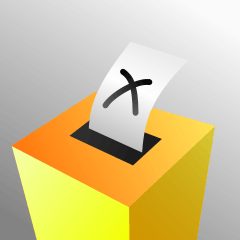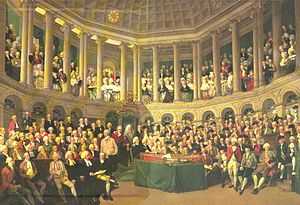House of Commons
| Part of a series on |
| Politics |
|---|
 |
|
Academic disciplines |
|
Organs of government |
|
Related topics
|
|
Subseries |
| Politics portal |
The House of Commons is the name of the elected lower house of the bicameral parliaments of the United Kingdom and Canada and historically was the name of the lower houses of Ireland, Northern Ireland and North Carolina. Roughly equivalent bodies in other countries which were once British colonies or federations thereof include the United States House of Representatives, the Australian House of Representatives, and the New Zealand House of Representatives and the Indian Lok Sabha.
In the UK and Canada, the Commons holds much more legislative power than the respective upper house of parliament. The leader of the majority party in the House of Commons usually becomes the prime minister. Since 2010 the House of Commons of the United Kingdom has had 650 elected members. The House of Commons of Canada has 308 members,[1] increasing to 338 members on October 2015. The Commons' functions are to consider through debate new laws and changes to existing ones, authorise taxes, and provide scrutiny of the policy and expenditure of the Government. It has the power to give a Government a vote of no confidence.
History and naming
The House of Commons of the Kingdom of England evolved from an undivided parliament to serve as the voice of the tax-paying subjects of the counties and of the boroughs. Knights of the shire, elected from each county, were usually landowners, while the borough members were often from the merchant classes. These members represented subjects of the Crown who were not Lords Temporal or Spiritual, who themselves sat in the House of Lords. The House of Commons gained its name because it represented communities (communes).[2] Members of the Commons were all elected, while members of the upper house were summoned to parliament by the monarch, usually on the basis of a title which would be inherited after the holder's death, or because they held a position in the realm that warranted special recognition, such as the bishops of the English and Welsh dioceses. After the Reformation, these bishops were those of the Church of England.
Since the 19th century, the British and Canadian Houses of Commons have become increasingly representative, as suffrage has been extended. Both bodies are now elected via universal adult suffrage. However, from the Middle Ages until the 18th century there was a tendency to limit the suffrage in various ways, creating by the 18th century a large number of rotten boroughs. In all countries, the House of Commons now as in the past may be prorogued for an election or some other purpose only by the Crown, represented outside the United Kingdom by the Governor General of each Commonwealth realm.

Specific bodies

The first purpose-built House of Commons chamber in the world. Painted c.1780.
Although it is common to associate the title of "House of Commons" with the Westminster system in general, in practice, only two states actually use the title.
British Isles
- The House of Commons of England (most at the Palace of Westminster, London) sat from 1295 to 1706
- The House of Commons of Great Britain (at the Palace of Westminster, London) 1707-1801
- The House of Commons of the United Kingdom (at the Palace of Westminster, London) 1801–present
- House of Commons of Ireland (at various locations in Dublin: Dublin Castle, Bluecoat School, Irish Parliament House) 1297-1801
- House of Commons of Southern Ireland (at Government Buildings, Dublin) 1921–1922
- House of Commons of Northern Ireland (at Parliament Buildings (Northern Ireland), Belfast) 1921–1972
Canada
- The House of Commons of Canada on Parliament Hill, in Ottawa, Ontario 1867–present
United States
- The lower house of the General Assembly of North Carolina was also known as the House of Commons between 1760 and 1868.
South Korea
- The House of Commons (South Korea) was the lower house of the 8-month Second Republic of South Korea (1960-1961)
See also
- House of Lords
- Lower House
- MPs Salaries in the UK
- House of Assembly
- Legislative Assembly
- National Assembly
- Lok Sabha
- House of Representatives
- Reconstitution, website of a charitable trust founded to promote public understanding of the British Constitution
References
- ↑ http://www.parl.gc.ca/information/about/process/house/partystandings/standings-E.htm
- ↑ A. F. Pollard, The Evolution of Parliament (Longmans, 1920), 107–08.
Coordinates: 51°29′59.6″N 0°07′28.8″W / 51.499889°N 0.124667°W